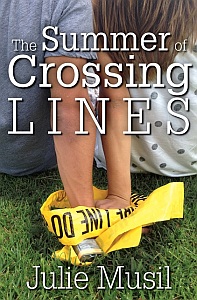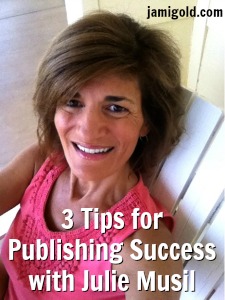It’s no secret in the industry that many authors are considering self-publishing on some level. Some authors are starting off as indie publishers, some are switching from traditional publishing to self-publishing, and others are releasing books under both methods and becoming hybrid authors.
So I was happy to host my friend Julie Musil earlier this year, when she shared her “Newbie’s Guide to Self-Publishing.” Now Julie’s back today to discuss some pitfalls of self-publishing and provide tips for avoiding those issues.
Honestly though, I think her advice is applicable to every author, no matter our publishing path. I’ll share my thoughts on that below, but first, please welcome Julie Musil! *smile*
*****
3 Pitfalls of Indie Publishing
(and How to Avoid Them)
I’ve become a huge fan of indie publishing. When I first decided to publish my debut YA novel, The Boy Who Loved Fire, I was nervous. I studied and analyzed everything I could about the process, and the more I read, the more I liked. As I prepared to publish my second novel, The Summer of Crossing Lines, I’ve had even more fun than the first time around.
But indie publishing is not all sunshine and daffodils. There are some gaping pitfalls that remain, and it’s up to professional, career-minded authors to avoid them.
Pitfall #1—Poor Quality
Indie publishing has come a long way since the early days of cheesy covers and wonky formatting. Still, we should strive to create a quality product—one that can compete with, and even surpass, that of traditional publishers. Indie authors have raised the bar and are now creating work that is difficult to distinguish as self-published.
Avoid the Poor Quality Pitfall by…
- Hire a professional editor. Bethany from A Little Red, Inc. edited both of my books. More resources can be found at the Insecure Writer’s Support Group blog. For tips on hiring a professional editor, click here. Make sure your manuscript has been through the ringer before you pay someone for edits, otherwise it’s a waste of time and money.
- Hire a cover designer. Covers are the first impression a reader has of your work. Don’t waste that first impression on a poor cover. I’ve worked with Jeff Fielder on both of my covers. Whoever you work with, make sure your cover is a simple, clean design that captures attention in a thumbnail. Click here for more information about working with a cover designer.
- Format ebooks and print versions properly. I formatted both of my books myself, and if I can learn how to do it, anyone can. Seriously. It was a steep learning curve, but I’m glad I took the time to do it. Now it’s easy for me to make changes to the book and upload new versions. Other authors hire formatters and swear by them. Susan Kaye Quinn has a comprehensive list of freelancers on her blog.
Pitfall #2—One Egg in a Basket
Authors who have only written one book are likely driving themselves crazy. They’ll doggedly check emails as they’re waiting to hear from agents or editors. The same can be said about indies with only one book out. Perhaps they’ll watch their sales graph all day long and obsessively check their rank. Why add that much stress to our lives?
Avoid the One Egg in a Basket Pitfall by…
Working on the next book. As I mentioned in my guest post at Fiction University, Marketing Strategy: The Next Book, it’s important for authors to move on to the next project. Nothing helps an obsessive writer more than obsessing about the next project. Indies must steadily work to create their own back lists.
Pitfall #3—Giving Up
Too many indie authors rush to put out a book and then obsess over sales. They then throw their hands in the air and think, “Why bother? I tried and failed.” Their high expectations were not met.
Avoid the Giving Up Pitfall by…
Having realistic expectations. You’re a small business now, so treat it as such. Make goals, work hard, and put out quality products you can be proud of. Connect with people on a personal level. Know before you leap into indie publishing that this will take time. Think of yourself as a wannabe Steve Jobs, tinkering in the garage, working on big ideas that you’ll passionately share with others.
Indie publishing has a lot to offer authors, mainly control. If we avoid the pitfalls, we can remain nimble, enjoy the now, and look forward to what’s next.
*****
 Julie Musil writes from her rural home in Southern California, where she lives with her husband and three sons. She’s an obsessive reader who loves stories that grab the heart and won’t let go. Her Young Adult novels, The Summer of Crossing Lines and The Boy Who Loved Fire, are available now. For more information, or to stop by an say Hi, please visit Julie on her blog, on Twitter, and on Facebook.
Julie Musil writes from her rural home in Southern California, where she lives with her husband and three sons. She’s an obsessive reader who loves stories that grab the heart and won’t let go. Her Young Adult novels, The Summer of Crossing Lines and The Boy Who Loved Fire, are available now. For more information, or to stop by an say Hi, please visit Julie on her blog, on Twitter, and on Facebook.
The Summer of Crossing Lines
When her protective older brother disappears, sixteen-year-old Melody infiltrates a theft ring, gathers clues about his secret life, and falls for a handsome pickpocket. At what point does truth justify the crime?
*****
Thank you, Julie! And as I mentioned at the top, I think every one of those pitfalls and tips can apply to any author, regardless of our publishing path.
Why Every Author Should Watch Out for These Pitfalls
#1: Poor Quality
If we take the traditional publishing path, we still need to ensure that our work is as good as we can make it before we start querying. But even beyond the query stage, we can use these same tips for judging a potential publisher.
Purchase a couple of their stories (if you know the name of the editor you’d work with, target stories they worked on) and check:
- Is the editing good quality?
- Are the covers attractive?
- Are the books free of wonky formatting?
If the answer to any of those questions is “no,” we can ask ourselves what value the publisher adds to justify their royalty cut. We might be better off rejecting a contract than getting involved with an unprofessional publisher.
#2: One Egg in a Basket
Obviously, traditionally published authors should work on their next book too, but they can also think about diversifying their baskets. Maybe they’d start another series with a second publisher, maybe they’d write in a new genre, or maybe they’d become a hybrid author. The point is that no one will ever care about our success as much as we will, so we should never make ourselves too dependent on one publisher or company.
#3: Giving Up
Going along with Pitfall #2, success will take time with traditionally published authors too. We don’t want to give up—or be forced out by canceled contracts, etc.—and feel helpless. There’s almost always another thing we can do or try. As Dory says in Nemo, “Just keep swimming.”
The fact that these same pitfalls can apply to self-published and traditionally published authors alike reinforces the idea that there’s no “perfect” approach. There are pros and cons to either path.
The important point is to recognize which path will work best for us (and that might be different from story to story). No matter how we decide, we can educate ourselves on how to avoid any pitfalls we might encounter. *smile*
Julie wants to know, have you indie published? Can you think of any pitfalls she missed? Do you agree that these pitfalls and tips can apply to authors regardless of their publishing path? How else might they apply? Do you have any advice to add, or questions for Julie to answer?

